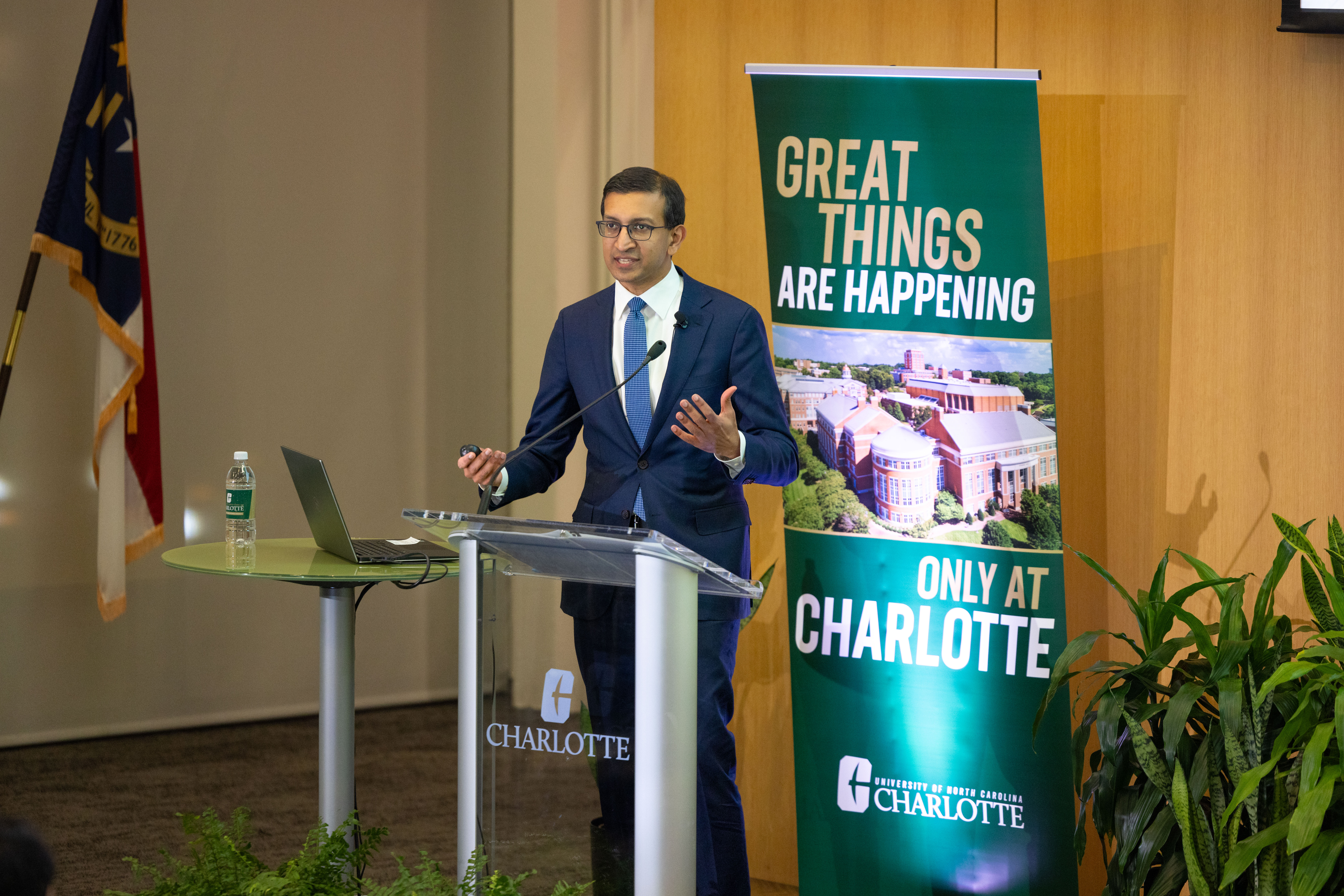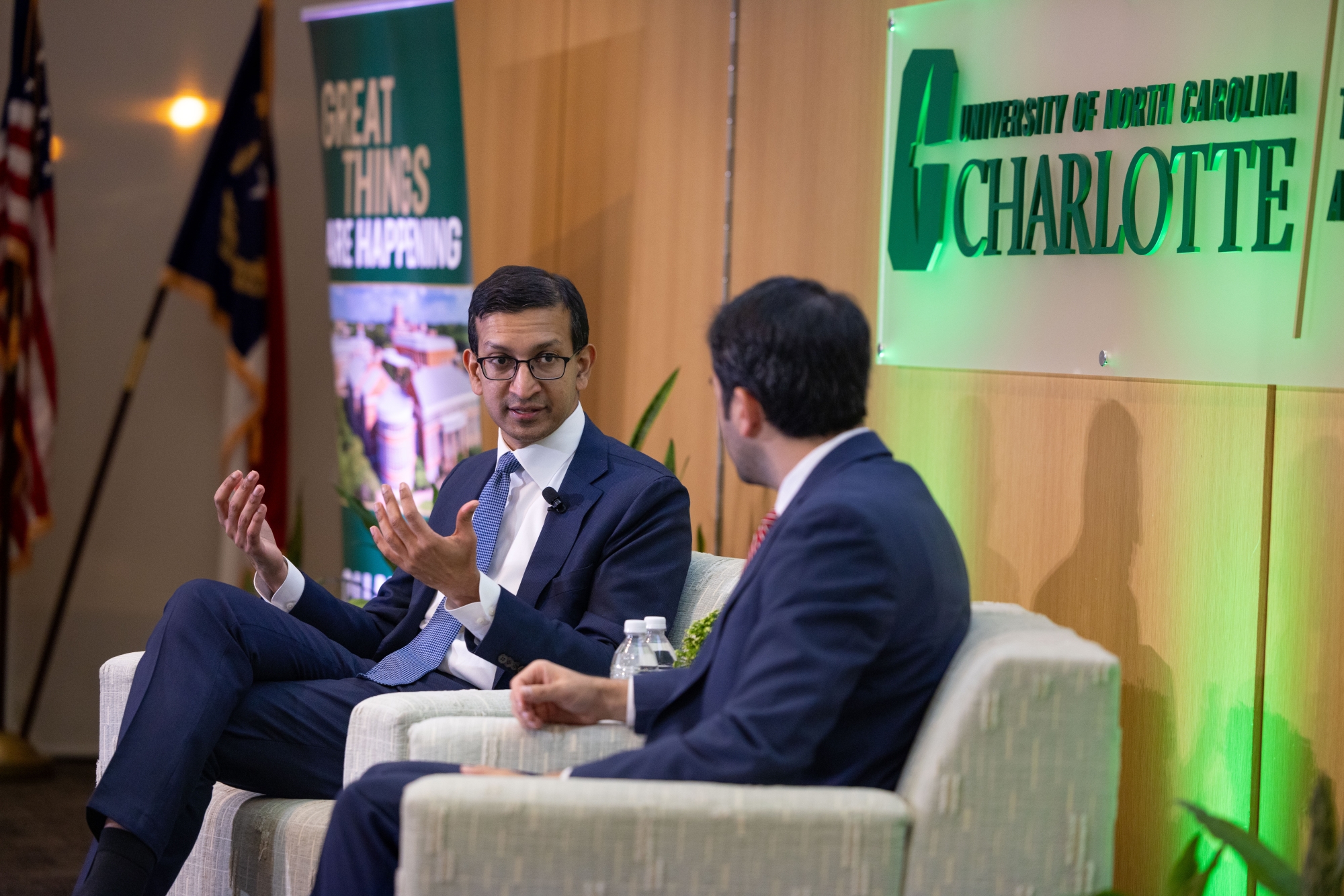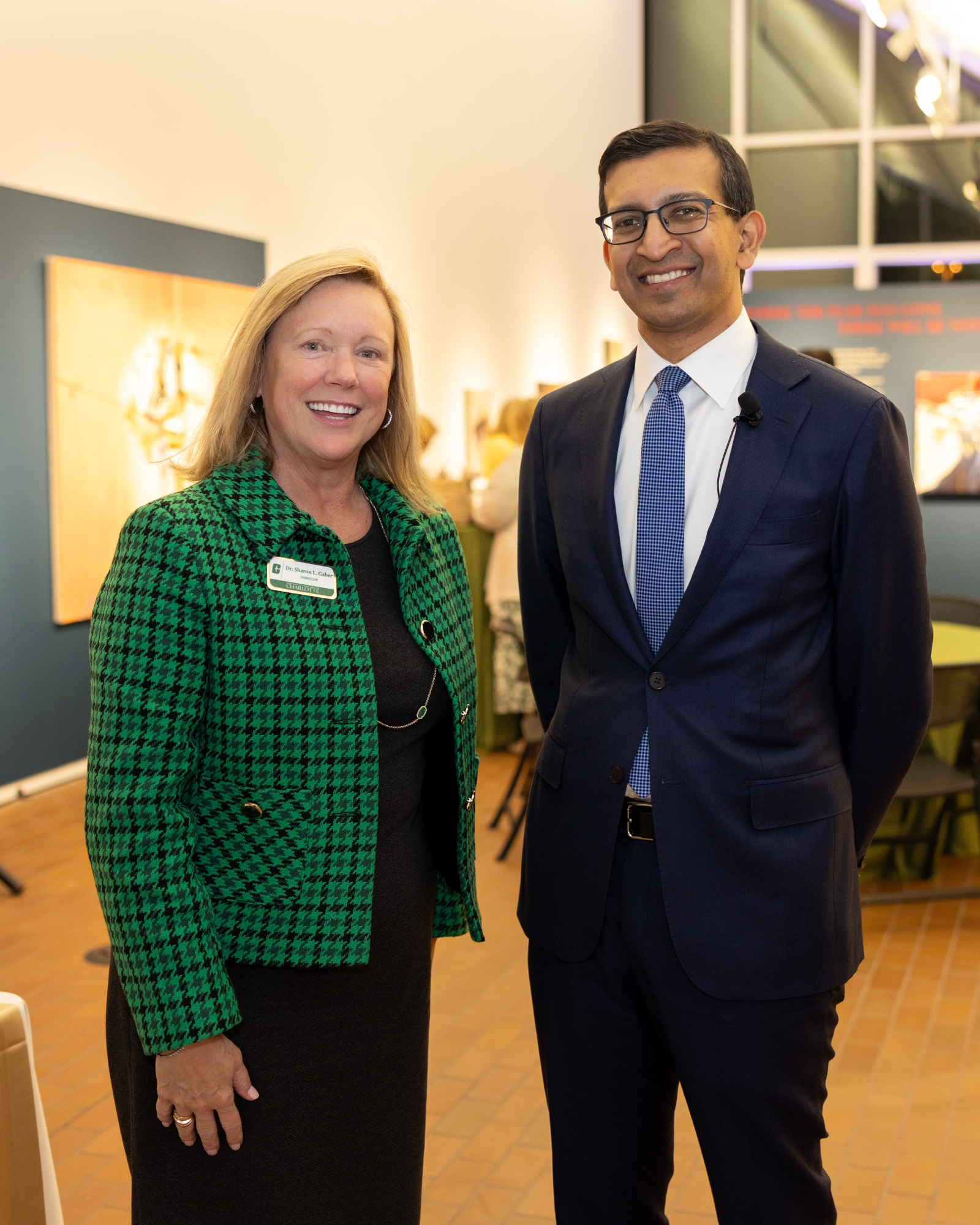
Pioneering economist Raj Chetty, the William A. Ackman Professor of Economics at Harvard University and director of Opportunity Insights, recently served as the keynote speaker for UNC Charlotte’s 12th annual Chancellor’s Speaker Series.
Chetty’s Nov. 14 visit came nearly 10 years after Chetty’s widely influential “Land of Opportunity Study” that found in 2014 that the Charlotte region as a whole ranked 50th out of the country’s 50 largest metro areas for economic mobility and spurred an unprecedented amount of investment in and research into the factors that led to Chetty’s finding and how best to address them by groups including the University’s urbanCORE and the UNC Charlotte Urban Institute, alongside and in collaboration with local and state government and non-profit institutions.
The day’s events included a moderated conversation that afternoon with UNC Charlotte students, faculty and staff, as well as an evening presentation and discussion with WFAE’s Ely Portillo at The Dubois Center at UNC Charlotte Center City. 
During his evening lecture and subsequent question-and-answer session, Chetty outlined some key findings he and his colleagues have made in the years since the groundbreaking “Chetty study.”
Here are a few takeaways:
The power of research in spurring civic investment
Chetty commended Charlotte for its proactive response to the 2014 study, noting the region's exemplary commitment to constructive action in the face of stark findings.
When Portillo asked Chetty about what surprised him about the reaction to his group’s 2014 economic mobility rankings, he praised Charlotte for how proactive the region and thought partners like the University were when faced with such a stark finding.
“Initially, as a researcher interested in these questions, it hadn’t occurred to me how putting out these data publicly could really spur public action.”
“I think Charlotte is really exemplary of that,” he continued. “And I find when I talk to people across the country, many people look to Charlotte as an example of a place that took those statistics and didn’t take it as ‘Oh, those statistics must be wrong,’ or ‘There’s some reason everything is actually okay here,’ but rather thought ‘Let’s constructively think about what we can do going forward.’"
Zoomed-in data shows clearer picture
The ability to analyze detailed data at the U.S. Census tract level has allowed researchers to identify specific areas, particularly within cities like Charlotte, experiencing disparate levels of economic mobility, often linked to historical racial segregation.
Segregation doesn’t tell entire story; friending bias also contributing factor
Chetty and colleagues’ research has shown children raised in communities with more cross-class interaction are more likely to escape poverty. That said, the impact of "friending bias" on social connections also limits such interaction. Even within integrated settings, children tend to befriend those similar to themselves, contributing significantly to cross-class disconnection.
Chetty referenced new research findings within the past nine years that show fighting segregation is only one part of the battle. “There’s another dimension that’s extremely important that we call ‘friending bias,’”Chetty explained. “Even conditional on being at the same school, we find that kids tend to befriend kids who are like them in terms of class or in terms of race.”
This can have a dramatic impact on the level of cross-class social connectedness, as new research has found “that about half of the social disconnection between low and high-income people in America is driven by this friending bias, rather than a lack of exposure,” Chetty said. While policy interventions designed to reduce levels of segregation are an important part of the puzzle, Chetty said, “what we’re finding is that’s only half the issue; Even if you manage to perfectly integrate every school, every neighborhood, every college… you’d still have half of the cross-class disconnection left.” Promising potential solutions to reduce friending bias include findings that cross-class friendships “are much more likely to emerge in faith-based religious organizations, or in recreational groups than in other settings, or in smaller schools than in larger schools,” Chetty said.
Hard work matters, but so does luck and environment
Chetty emphasized the influence of geographic location on future outcomes, underlying the importance of sharing opportunities more widely to address disparities.
To drive home his findings that the geographic location where a person grows up can have such an impact on their future outcomes, Chetty referenced a technique he uses in one of his classes where he asks freshman college students to imagine “What your life might have looked like if you had grown up two miles down the road rather than where you did.”
“I think part of what we’re seeing with these data – and I think it’s been helpful in framing the public narrative – is that opportunity really matters.”
“Part of our responsibility for all of us who are lucky to be here is to try to think about how we can share those opportunities more widely, building on the luck that we’ve had.
Upcoming study
A forthcoming economic mobility study, serving as a 10-year update to the 2014 project, is in the works. While not yet public, Chetty anticipates encouraging findings for Charlotte.
Chetty shared that his research group is in the process of finalizing a new economic mobility study that will serve in part as “a 10-year update” on the 2014 project that prompted so much local investment in increasing opportunity and has shaped so much of the important work that’s been done at UNC Charlotte and in the Charlotte community in the near decade since its publication – “What does economic mobility look like across America 10 years later, and how have things changed by race and class and so on?”
“We haven’t put that out publicly yet, but let me just end by saying that I think you all are going to be encouraged by what you see in that new study,” Chetty said.
